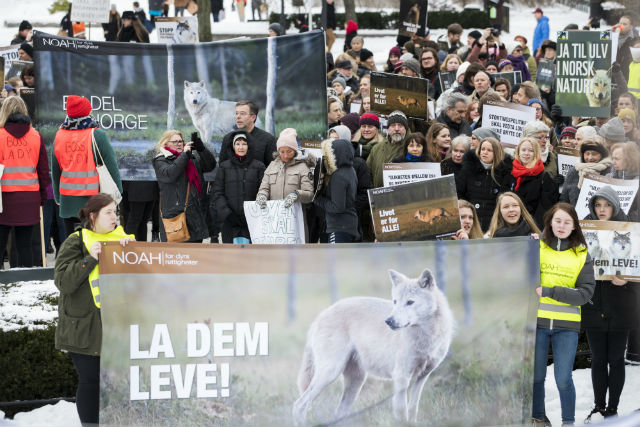
www.TheLocal.no
Animal rights activists in Norway have begun boycotting local sheep meat in protest at a new round of licensed wolf hunts planned for this winter.
More than 800 Norwegians have joined the Facebook Page Boikott konfliktkjøtt (Boycott Conflict Meat), which aims to pressure farmers to accept that the predators have a right to share Norway’s outdoor spaces with their flocks.
“I boycott sheep meat and know many more people who doing the same,” Geir Lorentsen, a local politician in Enebakk, south of Oslo, told Norway’s state broadcaster NRK.
“I want the sheep industry to recognize the need for viable populations of predators in Norway.”
Norway’s authorities ruled before the summer that up to 12 wolves could be shot outside the so-called ‘wolf zone’, as well as three wolf packs inside the zone.
Licenses will be issued for over 25 wolves to be shot in the counties of Hedmark, Akershus and Østfold.
Over 20 organizations have protested the decision, while farmers‘ organizations believe even more wolves should be shot, with the case to be heard on 22 August.
On the Boycott Conflict Meat page, wolf rights campaigners argue that the hunts are unnecessary. One post claims that of the 100,000 sheep found dead out in the fields in Norway every year, more than 90 percent die from illness or for other reasons unrelated to wolves.
But Ketil Melvold, deputy leader of farmers organisation Akershus Sheep and Goat, told NRK that wolves and sheep could not coexist.
“It’s physically impossible to have wolves in the same area as livestock. Those of us who have been out dragging away the carcasses understand that they don’t belong together.”
Although he does not support the boycott, Øyvind Solum, the green party politician who heads the committee deciding over wolf culls in Akershus, Oslo and Østfold, said farmers should realise how much the bad publicity might affect their businesses.
“I think farmers lose more from bad publicity than from wolves taking sheep,” he said. “If sheep meat appeared as the preferred sustainable meat, it would boost sales, but it will be hard when they use sheep to justify killing predators.”
Nortura, a farmers’ cooperative, says it has not noticed any dips in consumer demand as a result of the boycott.